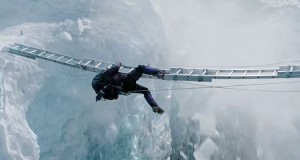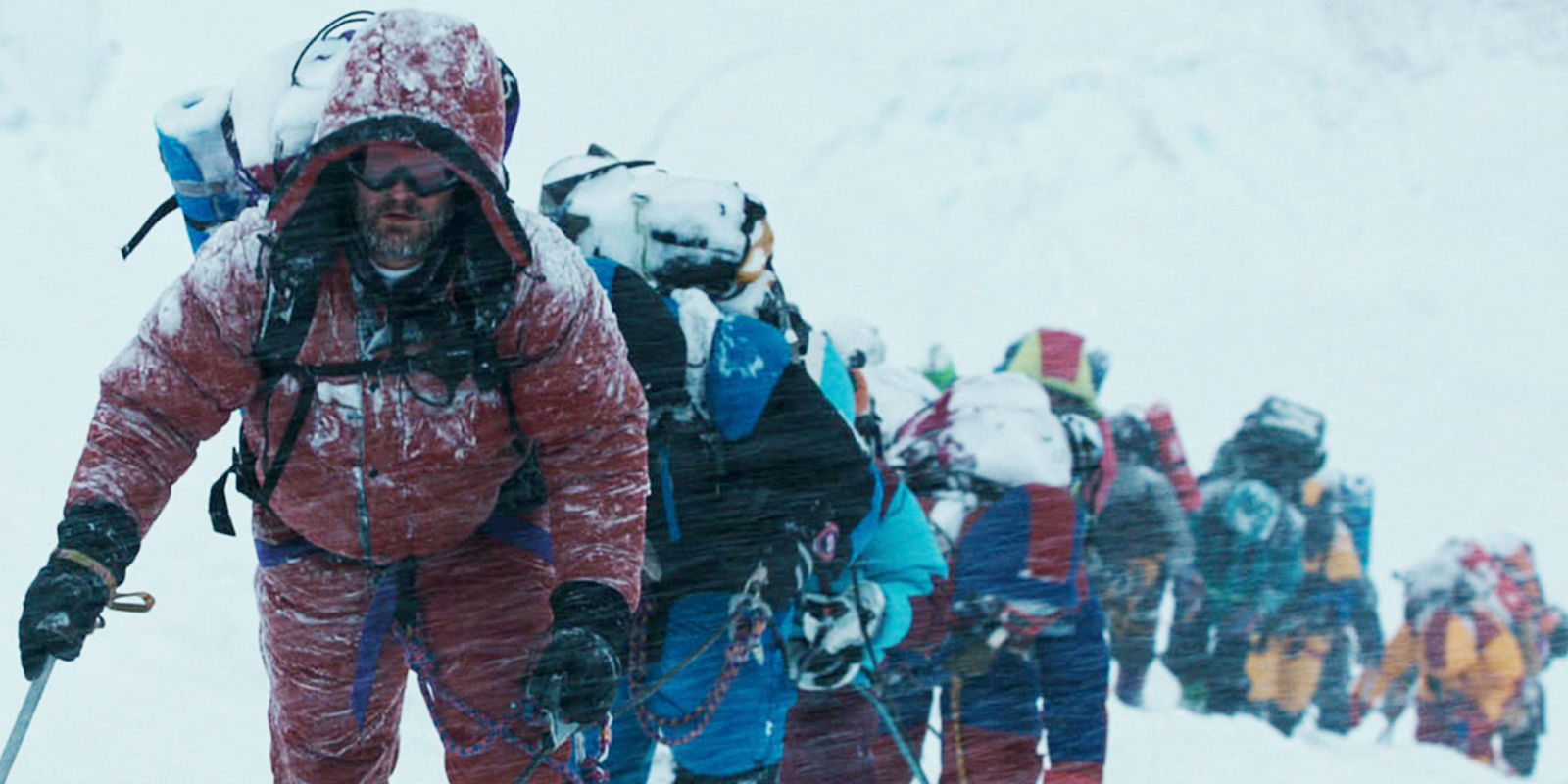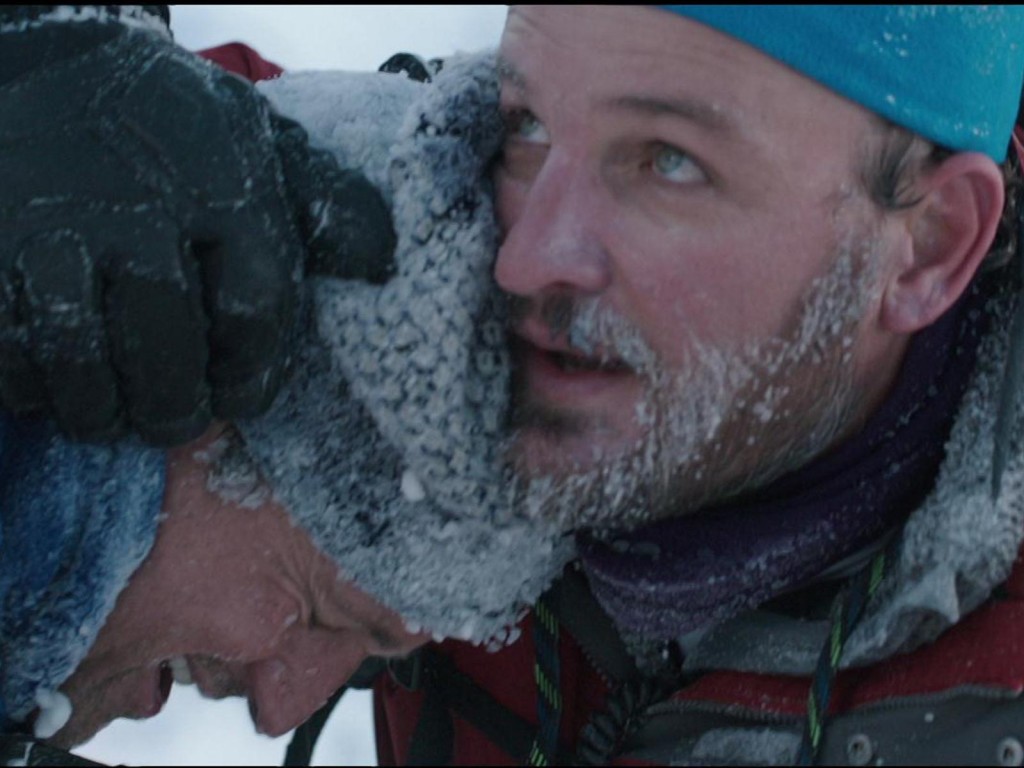Everest Movie Review and the Meaning of Life
I recently had the opportunity to watch the movie Everest and after all the amazing Everest IMAX footage, all the cliff hanger chaos, and the pell-mell chaos of the a freak blizzard, I came away with only one quote. There was one seminal moment of the movie that truly caught my attention and made me ponder the movie in an entirely different way. But before I get to that, I should set that moment up for you.
Everest The Making Of…
Everest, is a 2015 British–American thriller directed by Baltasar Kormákur and written by William Nicholson and Simon Beaufoy. The film stars Jason Clarke, Josh Brolin, John Hawkes, Robin Wright, Michael Kelly, Sam Worthington, Keira Knightley, Emily Watson, and Jake Gyllenhaal. The movie recounts the disaster that occurred on the mountain in 1996, and focuses on the survival attempts of two expedition groups, one led by Scott Fischer (Gyllenhaal) and the other by Rob Hall (Clarke). The movie came about due to the popularity of an amazing magazine article initially printed in Outdoor Magazine, and then made into a book entitled Into Thin Air by Jon Krakauer who happened to be amongst the climbers following Rob Hall’s team to the summit. Krakauer had initially planned on just staying at Base Camp and was to focus his writing on the commercialization of the race to the top of the world’s tallest mountain. But after the disaster, focused his writing on detailing out the circumstances that lead to the deaths of so many climbers.
Everest is currently out in theaters today and whole swaths of the movie were actually filmed on Everest itself with IMAX cameras. So it is a movie that begs to be watched in IMAX obviously. Obviously most of the actual film was done with CGI, but the film crew built a very impressive Base Camp at Cinecitta Studios in Italy, where large sections were shot, surrounded in green screen. Not only that, but they also built a the Hillary Step there as well. The main unit really did travel to Nepal in order to film the actors on their trek to the Base Camp, but obviously they were limited on how much they could actually film on the actual mountain.
During the filming on the mountain though there was a massive avalanche inside the ice flows section and it ended up killing 16 Sherpa guides that were responsible for sending up advance supplies in support of the season’s coming climbs. But after the avalanche the pick up film team negotiated another couple hours on the mountain, wherein they saw another avalanche that they said was very sobering to witness. With that the ceased filming on the mountain and put a call out to anyone that had been on the mountain over the last five years to get copies of their photos and videos to help with the digital design that was still needing to happen.
Everest Review

Which brings me to another point. There are so so many cooked grenades in this movie. You know what this means, no? A cooked grenade is someone that pulls the pin on a grenade, and holds it an extra amount of time so that it will blow up on landing. One cooks a grenade (holds it) in order to keep the grenade from getting thrown back at them. In movies, you see these sort of cooked grenades all the time. Remember the beginning of Avatar when they explain, in detail, how long you can survive on Pandora breathing the atmospheric oxygen? And what it would do to you? And then later in the movie when this knowledge becomes painfully relevant because our hero is about to suffocate?… but we know just how long he will survive because of cooked grenade? Those sorts of obvious tell tale signs at the beginning of the movie hint at situations that are coming later on. In Everest these cooked grenades are everywhere. They show up in the hinting of the coming congestion on the mountain. They show up in the conversation between a husband and wife about their unborn child. At one point I even was able to guess who would live and who would die based on the number of outstanding cooked grenades still waiting to explode.
But cooked grenades is the basic formula of how disaster films work. It is what it is. “Tectonic activity can’t exceed 9.9 or the core of the earth will melt.” (later) “OH NO ITS 9.7, NOW 9.8… 9.82, 9.84… Melt down IMMINENT!!” — “These ropes are specified to carry 180 lbs..” “Oh, interesting” (later) “We need to get out of this burning building, let’s go together… how much do you weigh??” Right? You get it. But it’s a clunky way to experience a movie. We are educated to the risk, and that same risk is realized exactly 80 minutes later. It’s ludicrously awkward.
But outside of that, the movie was very good. It’s hard to do wrong with this source material. If you haven’t read the book, I highly recommend it. If you start it though, be prepared to read until you are done… it’s that good. Occasionally the movie becomes very difficult to understand and I found myself wanting some graph paper while I was watching. A, B, and C are just outside camp 4. C went back to get Oxygen, and take it up to the Hillary Step. In route he passed D. Who was unconscious. E and F were still at the summit, 2 hours past the turn time. G is on his way up from Base Camp, and met up with A and B and they decided to go help C, but C was nowhere to be found. It gets complicated. Which ends up making the ending very complicated.
But the cinematography was very good. The acting was very good. The script was stilted. And the flow was a bit forced at times. And yet, I can’t in my right mind not recommend it. (For you at home, tracking the double negatives in that sentence, yes, I was saying I recommend it. Can’t Not recommend it, to be specific.) So yes, go see it. Make sure you see it in the theater. The movie is big big. Just really good visuals. But go for the mountain and for the disaster. Don’t go for the characters…
The Problem with Everest
Now, to the larger problem I have with the movie… which has nothing to do with the movie, but has everything to do with that one quote I referred to at the beginning of this post. Beck Weathers was the big time wealthy client on Rob Hall’s expedition group to the summit of Everest. And as the movie rolls on, we sense that Rob and his wife Peach Weathers (Robin Penn Wright) aren’t exactly doing great. There is a coldness in their conversation and a distance that transcends their geographical distance. And we learn that Beck has been told that if he climbs another mountain Peach is going to divorce him. And yet, here he is, climbing Everest. And on top of that, he’s totally forgotten to acknowledge their anniversary which happened the day before. And when Krakauer asks him why he does it, he gives a lame answer, but later doubles back and says, “The truth is, when I’m not on the mountain, there is a dark cloud that covers me…”
And I think this one quote details the problem that we find as a society. We medicate. We avoid. We work so hard to hide from the pain and unanswered questions in life. Beck is rich, and yet he can’t just be happy with his kids, his wife, and his success. Instead, he takes off and jeopardizes his marriage, let alone his life, by climbing mountains recklessly. But without the pain of climbing, the oxygen deprivation and the overarching adrenaline of climbing, he doesn’t feel actually alive.
Why is that? Why can’t we be happy with what we have? Why aren’t we content?
Well, even though society works so hard to avoid death and avoid the discussion of the shortness of our lives, we are acutely aware that our ends are imminent. And when you consider this truth, we are overwhelmed by the simple fact that we are but dust in the wind. So we medicate to avoid this truth. We write books. We watch movies. We take actual drugs. We have affairs… all in the hope of actually feeling alive… all in the hope of finding the meaning and purpose of life.
Here’s the catch though. We laugh at Christians. We laugh at people that require the crutch of religion. But in the end, we medicate ourselves to death in our attempt to survive our disbelief. Nietzsche was the strongest atheist ever, oh, until his atheism made him completely mad. And I’m a huge Nietzsche fan. Huge. He was able to tear down the societal crap and the nonsense of this life, including God. But he wasn’t able to find a purposeful alternative to a creator. Not to go too far into the weeds, but Nietzsche basically made the exterior question of the meaning of life irrelevant. Instead he stated that it was the interior self (consciousness) that we needed to ask this question of.
“Because of the logical force of this turn to the individual self, Nietzsche cannot provide a general answer to this question [as to the meaning of life], but only one which is related to the self, or rather: to himself, to him personally. This must be taken into account when one reads his answer, in which he refers to a general “you”: “why you, individual, exist, this ask yourself, and if no one can tell you, then try to justify the meaning of existence a posteriori by setting for yourself some purpose, some goal, some ‘therefore’, a high and noble ‘therefore’. Perish in pursuit of your goal – I know no higher life-purpose than to perish in the pursuit of something great and impossible […].” (2. UM 9; 1, 319).”
So our societal predilection to grasp for the impossible was predicated by a group of philosophers that have pushed us over this particular cliff. I don’t know the meaning of life for us all, but I do know the meaning of life for you… and it is to do something great. Which starts to all come full circle now. We don’t know what the meaning of life is. But we have this uncontrollable desire to be known and to be seen. And if we were to accomplish something truly impossible – like climbing a 30,000 foot mountain – maybe, just maybe we will have found the meaning of life.
When I watch Everest, I see a lot of myself in the movie. Life can be hard, no matter how relatively easy we’ve had it. Depression and the oppression of our coming demise is truly crippling. And so climbing a mountain to make sense of our lives makes sense to me. Though literal peak climbing isn’t my specific thing. But putting ourselves at risk of dying is a very real way that we can “live”. We all understand that Quantity isn’t Quality. If we escape death through our living, maybe we are more alive, and therefore more real? If we can dodge death on a mountain, then maybe we are more alive as a result. But eventually we all have to come down from the mountain. Eventually we all have to walk into the quiet years of our lives and eventually we will all die.
So this is seen as a logical fallacy by anyone with half a clue. Nietzsche proclaims that the meaning of our lives is to accomplish the impossible. To scream against the tide of mediocrity, to become the übermensch, and in so doing effect the lives of everyone around you… to drag them closer to this meaning of life through your living. But if we look at the lives of those who have accomplished the impossible, they are no more happier than we are. Right? It just logically makes sense, although we like to place them on some sort of pedestal. But at the end of the day, they are just as lost as we are. And so we are just left with the fact that mountain climbing is just another drug to avoid the pain. It’s a natural drug. But it’s a drug all the same.
So few people struggle with the real questions of life. (Which is why I loved Nietzsche so much. He really struggled with the point and purpose of it all. He ultimately failed, but boy did he really struggle with it.) Do you struggle with the meaning of life? Have you come to terms with the fact that you might die tomorrow and then what is left of your “legacy”?
Everest was a good movie, but it was a gaping maw of an open wound when it came to answering the question about the meaning of life. Or the meaning of why we even struggle to make our lives relevant. But I applaud it for asking the question, even if it wasn’t able to answer the question it asks.


